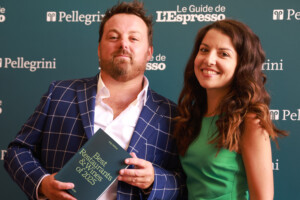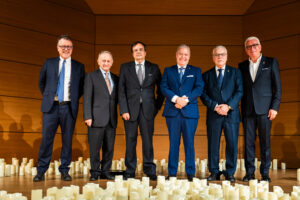As a privileged gateway to the boundless Chinese market, Hong Kong, like the whole of Asia, is today a closed port, not for goods but for travelers, both incoming and outgoing. The Covid-19 pandemic has had a less dramatic impact on health here - in terms of numbers - than what we have experienced in Europe and more generally in the West, but the social backlash is destined to last for a long time yet, with important after-effects from various points of view, starting of course with the collapse in travel. This is no small segment, if we consider that international tourism, in Hong Kong, in 2019, brought in a flow of €31.2 billion, which collapsed to €2.5 billion in 2020, while in China it went from €34.2 billion in 2018 to €12.5 billion in 2020. But the biggest impact, in this sense, is for the destination countries of Chinese (but also Hong Kong) travelers, who in 2018 spent 234.8 billion euros on foreign travel, and in 2020 just 114.4, less than half, according to the latest “Survey on International Tourism” signed by Bank of Italy.
In an increasingly global world, where distances have been reduced to the point of nullifying, the road linking Asia and Europe, and therefore Italy, risks becoming long, very long again, especially from a cultural point of view. Something is inevitably changing in the world balance and in the lifestyle of millions and millions of citizens, and the paradox is that the economy, in its fundamentals - once the inflationary storm that has hit raw materials, energy and the supply chain at all levels has passed - is not destined to be overwhelmed. However, it has changed, and the wine sector will also have to take this into account, starting with fine wines, top quality labels with high added value, which have carved out a very important space in China and Hong Kong. Including Italian wines, which in the old British colony have an important reference point in the auction house Gelardini & Romani, which for years has moved the fulcrum of its work from Rome to Asia, becoming over the years importers and distributors of brands such as Montevertine, Produttori del Barbaresco, Tenuta di Fiorano, Biondi Santi, Cupano, Pietracupa, Damilano, Paitin, Tenute Bosco, Viberti, Manzone and Podere Forte.
Raimondo Romani, who together with Flaviano Romani founded the Gelardini & Romani Wine Auction house, told WineNews, almost live, about the epochal changes that are affecting the South China Sea, a very important crossroads for trade and wine exchanges. “Hong Kong was, and there is every reason to believe that it will remain for a long time to come, the main “clearing house” between China and the rest of the world, despite the great changes that have taken place and many more that will take place in the next few years, starting with the development of the Great Bay Area - a market of over 200 million inhabitants with a GDP equivalent to that of Australia - which, in terms of infrastructure, is already a reality. The biggest and most evident difference with the past is the almost substantial closure of the borders, a closure which originated with Covid-19 but which, in all likelihood and in a different way from the current one, will survive Covid itself, especially in Mainland China, where they now feel independent from the know-how of foreigners who, if yesterday were welcome, are now tolerated. A form of closure that should not be confused with the contingent border closures of most other Asian and Oceanic countries (where the policy of achieving zero contagion prevails rather than the Western vision of “living” with the virus), from Japan to Thailand, from Australia to New Zealand, which, although extremely rigid at the moment, are exclusively linked to the pandemic and will probably end with it”, explains Raimondo Romani.
The first consequence, as anticipated, is that “both in Hong Kong and China there is no more foreign tourism, the expat communities are thinning out, and the vast majority of the local population practically no longer travels. In fact, the only segment of the Horeca industry that is really in crisis is the hotel industry, and the products destined for it, a sector that in Hong Kong is saved only by compulsory quarantines and local weekend tourism, which they call “staycation”, meaning spending the weekend in a hotel, but in one’s own city, perhaps just a few meters from home. From this point of view, knowing the vision we have from the West, the situation seems dramatic”, continues Romani of Gelardini & Romani Wine Auction, “but the economic system is adapting rapidly, it continues to grow, and above all, they have already become accustomed to no longer traveling and, indeed, many are now not thinking of traveling to the West even when the borders are open. The high number of deaths and the asymmetric reaction to the pandemic in the West have been a shock here, so now they feel safe only at home where, in terms of goods and services, nothing is lacking”.
And so, if it is not people who move, it will be goods, as was essentially the case until half a century ago, that will carry diversity and cultural peculiarities around, and wine “although it weighs very little on the trade balance - compared to sectors such as energy, technology, construction and industrial mechanics - remains one of the best vehicles, even in the long term, for spreading the image of Made in Italy. In fact, they are more likely to take a plane to visit a vineyard than to go shopping or to see an exhibition, given the cultural distance that separates the majority of Asians from Europeans: Asian languages and cultures are increasingly contaminated with each other but are almost completely independent from Greco-Roman or Renaissance cultures. They have a gastronomic tradition that in fact does not have many points of contact with that of the West, while wine - which basically cannot be paired with Asian cuisine, at least as we conceive it dish by dish, despite the countless and praiseworthy attempts to do so - is one of the few products, for us an identity, that can continue to be integrated into the daily lives of a vast and growing segment of the affluent Asian population. On the other hand, the supply of quality wines will not be able, at least for several decades, to be replaced by local production, as is already happening in other iconic sectors of Made in Italy, such as fashion for example”.
In such a complex context, “Old World wine in Asia is still a “premium”, and is burdened by duties in practically all markets, except in Hong Kong, where, however, the costs of logistics affect the entry level even more than the duties, and it is not likely, nor desirable, in my opinion, that this perception will change. For this reason, applying the same commercial sales strategies in Asia as in the West is a failure, and this is not just an Italian sin: other Old World producers have done the same. While French wines, in general, got off to an easy start, enjoying a privileged position resulting from the pre-eminent Anglo-French colonial presence in Asia for over two centuries, the real driving force was the iconic Bordeaux wines, with Château Lafite at the top. Italian producers always think that the French are better at teamwork, and the Spanish, Austrians and Germans say the same thing about the Italians, but today, having discounted the advantages deriving from colonialism, in terms of image we are more or less all at the starting blocks, with our respective identities to promote, which are made up of strengths and weaknesses”.
Returning to France and its commercial approach, Raimondo Romani recalls, “it should be pointed out that the Anglo-French distribution network, with its epicentre in the Place de Bordeaux, can still boast an undoubted primacy in terms of capillary presence, And the fact that several Italian labels are now distributed through La Place de Bordeaux - from Ornellaia and Masseto, to Antinori with Solaia, Bibi Graetz and soon other leading wineries in the Frescobaldi galaxy - tells us that we are not the only ones to focus on Italian excellence”, Raimondo Romani stressed. “A positive signal from the world of Italian wine would, however, come from the aggregation of participation in the creation and management of a common agency for distribution, which would be a more far-sighted choice in these markets, in our opinion, than relying on operators of apparent fame, of whom, from Italy, it is difficult to make an overall assessment. We have often seen operators make mistakes in chasing prestige and wealth, which are almost never a guarantee of success and solvency”.
In terms of mere “tastes”, Raimondo Romani resumes, “a special mention must also be made of aging: the Asian palate prefers mature wine, no matter whether red, white or bubbly, they always prefer the mature vintage, even blind. They may even buy the current vintage, which is very rare, but to put it aside. And on this few, very few wineries, mostly because they have not been able to sell all the stock year by year, maintain a history which then, practically no one, prices according to the quality of the vintage but increasing the price with a more or less fixed increase from year to year, a fact that in Asian eyes communicates that the producer himself does not have a real perception of his own history”.
So far, these are the prerequisites for at least trying to gain market share in Hong Kong and China, but the markets must be guaranteed a certain presence in one way or another. “Since the start of the pandemic, online tastings and webinars have been indispensable tools during the emergency, and will certainly be further developed in the future, but they can never completely replace in-person activities for promotion and above all for maintaining and developing a sales network. From this point of view”, says Raimondo Romani of Gelardini & Romani Wine Auction, “Gelardini & Romani has always worked to maintain a quota of activities in presence: our only auctions, and among the few wine promotion events in presence in Hong Kong, along with those of James Suckling, who has now established the center of gravity of his activities in the city. In order to implement our distribution network, we have also focused more on local staff, provided that they are passionate about Italy and willing to undergo training that is not limited to wine but also includes learning the Italian language and our culture, because if the strength of our wines lies in their identity and culture, as much as in the intrinsic goodness of the product, without culture and identity they will not sell. As long as it was possible to move quickly and comfortably from one continent to another, it was possible to cultivate the illusion that the frantic tours, in which foreign salesmen visited Tokyo, Hong Kong, Shanghai and Bangkok in a week, made it possible to manage these markets continuously and remotely. Today we see how ephemeral that network of relations was, just as ephemeral are the results that can be expected by those companies that today chase after compatriots and friends, already resident in Asia, who most often work in other sectors”, adds Raimondo Romani.
Something, of those intensive tours, remains, and “it is the work on the brand, for those who have done it and have not limited themselves to seeing Asia only as the market where to unload the unsold products of other markets. In this sense, the panorama is really very varied, we go from companies that, although small, make every possible effort to enhance their brand and make it available in all markets (they are the ones that then benefit from a revaluation on the secondary market that allows them to gradually increase prices ex cellar), to large companies that maybe sell 80% in one market on a permanent basis, which pays well and is culturally homologous, without looking at the rest of the world, except when they have to make money, thus cyclically devaluing the image of their product for which they then find it hard to digest price increases, i.e. the only way to increase turnover where there is no possibility of increasing production or reducing costs”.
Also because, “markets are changing and the transformation is driven by the geopolitical revolution that is underway and that, irreversibly, will give us back a world order that is different from the one that has governed the world since the Second World War and that, beginning to crack in 1989, has now reached its end. It is a revolution, with a very uncertain outcome, that cannot be ignored”, emphasizes Raimondo Romani of Gelardini & Romani Wine Auction, “especially if major, long-term investments have to be made, investments that during the pandemic have been aimed at expanding and renewing production spaces and public reception, without any real logistical and financial planning to create the mass of history that, over time, can then become the flywheel of the commercial offer. Lastly, there is the question of duties, which we have seen the consequences of in the case of Australia, which had put all its eggs in the Chinese basket and now that duties have practically doubled, has lost its main market (at least for entry level wines) or the shiver that ran down the spine of Italian producers when Trump announced an increase in duties for our wines, which then hit French wines instead”.
Copyright © 2000/2025
Contatti: info@winenews.it
Seguici anche su Twitter: @WineNewsIt
Seguici anche su Facebook: @winenewsit
Questo articolo è tratto dall'archivio di WineNews - Tutti i diritti riservati - Copyright © 2000/2025

























































































































































































